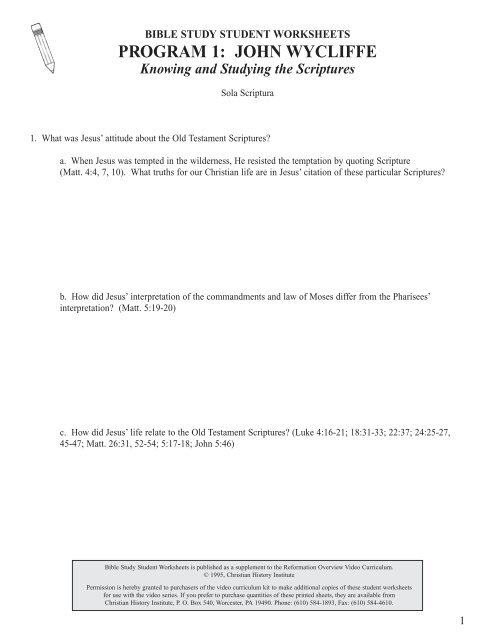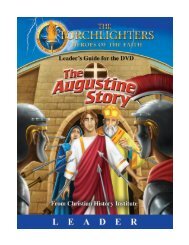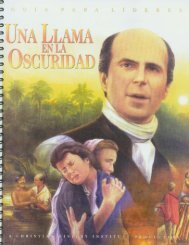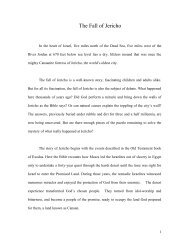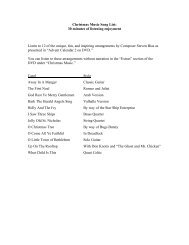PROGRAM 1: JOHN WYCLIFFE - Vision Video
PROGRAM 1: JOHN WYCLIFFE - Vision Video
PROGRAM 1: JOHN WYCLIFFE - Vision Video
Create successful ePaper yourself
Turn your PDF publications into a flip-book with our unique Google optimized e-Paper software.
BIBLE STUDY STUDENT WORKSHEETS<br />
<strong>PROGRAM</strong> 1: <strong>JOHN</strong> <strong>WYCLIFFE</strong><br />
Knowing and Studying the Scriptures<br />
Sola Scriptura<br />
1. What was Jesus’ attitude about the Old Testament Scriptures?<br />
a. When Jesus was tempted in the wilderness, He resisted the temptation by quoting Scripture<br />
(Matt. 4:4, 7, 10). What truths for our Christian life are in Jesus’ citation of these particular Scriptures?<br />
b. How did Jesus’ interpretation of the commandments and law of Moses differ from the Pharisees’<br />
interpretation? (Matt. 5:19-20)<br />
c. How did Jesus’ life relate to the Old Testament Scriptures? (Luke 4:16-21; 18:31-33; 22:37; 24:25-27,<br />
45-47; Matt. 26:31, 52-54; 5:17-18; John 5:46)<br />
Bible Study Student Worksheets is published as a supplement to the Reformation Overview <strong>Video</strong> Curriculum.<br />
© 1995, Christian History Institute<br />
Permission is hereby granted to purchasers of the video curriculum kit to make additional copies of these student worksheets<br />
for use with the video series. If you prefer to purchase quantities of these printed sheets, they are available from<br />
Christian History Institute, P. O. Box 540, Worcester, PA 19490. Phone: (610) 584-1893, Fax: (610) 584-4610.<br />
1
2. What was the apostles’ attitude toward the Scriptures?<br />
2<br />
a. How did Paul say the Scriptures could affect the believer’s life? (II Tim. 3:15-17; Rom. 15:4;<br />
I Cor. 10:11)<br />
b. What did Peter say was the source of the Scriptures? (II Pet. 1:21; I Peter 1:10-12)<br />
c. How does the way the New Testament writers quote Scripture show that they believed the Scriptures were<br />
from God? (Heb. 1:5-13; 3:7; 4:3; 10:5-7, 15-17 cf. Acts 4:25; 28:25-27).<br />
d. Read the following passages and explain how they show that the apostles considered the gospel and the<br />
New Testament to be “Scriptures” along with the Old Testament (I Cor. 2:12-13; II Peter 3:15-16; I Tim.<br />
5:18 cf. Luke 10:7).
3. Psalm 19:7-14 is both a concise and monumental statement on the Scripture’s effect and importance. Read<br />
through the passage carefully and make two lists—one on the characteristics of the Scripture, the other on the benefits<br />
of the Scripture (see also Psalm 119, a more lengthy praise psalm extolling the Scripture as the law of the Lord<br />
containing everything man needs to know for right living).<br />
PSALM 19:7-14<br />
Characteristics of Scripture Benefits of Scripture<br />
3
4. In the Old Testament, God’s people frequently departed from the Scriptures and had to be renewed in their faithfulness<br />
to God’s law. Two such incidents were in the days of Josiah and in the days of Nehemiah. Read their<br />
accounts in II Kings 22:8-23:25 and Nehemiah 8. What effect did recovery of the Word of God have on the<br />
spiritual, social, and moral life of the people?<br />
5. Learning the Scriptures and studying the Bible are not ends in themselves. Rather, they are to produce results.<br />
In Matthew 13:1-23, the parable of the sower, Jesus described four different ways of hearing the Word of God. Read<br />
the parable and Jesus’ explanation, then list the four kinds of hearers of the Word.<br />
6. The following are key Scriptures on the power of the Word of God: James 1:19-25; I Peter 1:22-2:3; Colossians<br />
3:16-17; Luke 11:28; John 17:17; Hebrews 4:12. From these passages, why would having the Scriptures easily<br />
accessible to all Christians be important? (Be specific here!)<br />
4
BIBLE STUDY STUDENT WORKSHEETS<br />
<strong>PROGRAM</strong> 2: <strong>JOHN</strong> HUS<br />
What is the Church?<br />
1. The Scriptures use many different images to describe the Church. What images of the church are used in the passages<br />
below? What special truths about the church does each image emphasize?<br />
John 10:1-18<br />
Ephesians 5:23-30; 1:22-23<br />
Ephesians 2:18; 3:15; 4:6; I Peter 5:2-4<br />
I Corinthians 3:16 cf.<br />
Ephesians 2:19-22<br />
I Corinthians 12<br />
John 15:1-10<br />
I Peter 2:5, 9-10<br />
5
2. The church is mentioned two times in the Gospels, and Hus considered each occurrence very important. In his<br />
day, the Roman Catholic Church interpreted Matthew 16:18 to mean that Christ built His Church on Peter, whom<br />
they considered the first pope and founder of the papacy. Hus, however, contended that the Rock, the foundation of<br />
the Church, was Christ Himself. Several other Scriptures speak of Christ as a Rock or Foundation Stone.<br />
• In each of these passages, what is the main theme emphasized when Jesus is called the Rock or Foundation Stone?<br />
• How would such passages give John Hus courage and confidence when attacked by the church hierarchy of his day?<br />
• How should these passages affect our understanding of the church today?<br />
Romans 9:33 (Isaiah 28:16)<br />
I Corinthians 10:1-4<br />
I Peter 2:6-8<br />
Acts 4:11<br />
Ephesians 2:19-22<br />
The Roman Church emphasized that the pope, as the heir of St. Peter, was the head of the church. Hus and the<br />
Reformers believed that no earthly head had been established over the church, rather Jesus Christ himself was the<br />
head of the Church (Eph. 1:22; 4:15; 5:23; Col. 1:18; 2:19).<br />
3. The second occurrence of the word “church” in the gospels is in Matthew 18:17. Hus considered Matthew<br />
18:15-20 an important Scripture describing the process of church discipline. Read the passage and list the steps<br />
involved in disciplining a sinning Christian. How do these steps compare with the church’s treatment of Hus for<br />
“heresy?” [Hus argued that in the New Testament church discipline was a local matter. He protested excommunications<br />
being issued all the way from Rome.]<br />
6
4. In describing the church of his day, Hus, as did Wycliffe before him, distinguished between the visible and the<br />
invisible church. Often he felt that the church leaders of the visible church were not part of the true or invisible<br />
church. The following are some Scriptures used to support this distinction:<br />
a. Matthew 7:15-27<br />
How can the true Christian be distinguished from the false Christian?<br />
According to v. 21, who will enter the Kingdom of Heaven?<br />
What will happen to the “professing Christians,” those who have many works but no true holiness<br />
in their lives?<br />
According to the parable of the foolish man, why will false, “professing Christians” be rejected by Christ?<br />
b. Matthew 13:24-30, 36-43<br />
What does the parable of the wheat and tares say about the nature of the visible church until Christ comes?<br />
c. Matthew 25:1-46<br />
How had the “sheep” behaved in this life?<br />
How had the “goats” behaved in this life?<br />
Even in the Day of Judgment, how does the Lord show His identification and care for the poor and lowly?<br />
How would Hus have applied these Scriptures to his own day?<br />
How can these Scriptures be applied to the Church in our day?<br />
How can they be applied to our individual lives?<br />
7
5. Hus believed in the one, universal church composed of believers chosen by God throughout time and into eternity<br />
(Hebrews 12:22-24). He also believed in the local church, and he saw his ministry as primarily a preaching ministry<br />
to his local congregation at Prague. He believed, as noted in point #3, that church discipline was a matter for the<br />
local congregation (Matt. 18:15-20). Read the following Scriptures and develop a list of other characteristics and/or<br />
functions of the local church:<br />
8<br />
Acts 20:28 I Corinthians 1:2 Acts 2:42<br />
Acts 14:23 I Thessalonians 1:1; 2:1 Hebrews 13:7<br />
Hebrews 10:25 I Timothy 3:1-15 I John 4:1-3 cf. 2:19<br />
Passage<br />
THE LOCAL CHURCH<br />
Characteristics Functions
BIBLE STUDY STUDENT WORKSHEETS<br />
<strong>PROGRAM</strong> 3: MARTIN LUTHER<br />
Justification by Faith Alone<br />
ROMANS 3:21-5:21<br />
Romans 3:21-5:21 is the second major part of Paul’s masterful epistle to the Romans. In Romans 1:1-3:20 Paul<br />
carefully established the fact that all have sinned against God’s perfect righteousness. In Romans 3:21-5:21 he<br />
shows that peace can be established between a righteous God and sinful man. How? By being justified through<br />
faith in Christ. The Greek word “righteous” (or its root “to justify”) is used over 60 times in Romans. There are<br />
similarly 60 references to faith or unbelief in this letter. “Justification by faith” is certainly a main theme of this book!<br />
1. Romans 3:21-31 Here Paul answers the question Job wrestled with: “How can a man be in the right before<br />
God?” in Job 9:2.<br />
How can people know about the righteousness of God and how can we become righteous? (v. 21)<br />
How does a person become righteous or justified? (v. 22, 27-28; Rom. 4:5; Gal. 2:16)<br />
How does a person acquire faith? (v. 24; Eph. 2:8-9; Heb. 12:2)<br />
One of the problems the truth of justification deals with is the question of how God can remain just while also<br />
justifying (or declaring righteous) sinful people. How is this problem solved? (v. 26; II Cor. 5:21)<br />
Note that this passage is bounded by verses 20 and 31, which emphasize that we are not justified by the works of the<br />
Law, but that we are able to accomplish the works of the Law once we are justified! This brings us to the truth that<br />
true faith results in justification, which in turn produces fruit.<br />
9
2. In Romans 4:1-8 Abraham is cited as an example of justification by faith, not works.<br />
When was Abraham justified or declared righteous? (v.3)<br />
How was Abraham not justified? (v.2)<br />
An underlying theme of this passage is that justification by faith glorifies God but justification by works gives<br />
people something to boast about. How does justification by faith bring glory to God?<br />
What analogy does Paul use in this passage to emphasize that justification is the free gift of God? (vs. 4-5)<br />
According to v. 5, whom does God justify? What does this mean in light of Matt. 9:9-13?<br />
10
3. In Romans 4:9-17 Abraham is given as an example of justification by grace, not by law. In this passage Paul<br />
deals with the Jewish ritual of circumcision, which many Jewish rabbis said was necessary for salvation. Though<br />
circumcision might not have been an issue in Luther’s day, the saving virtue of religious rituals and ceremonies, the<br />
Roman Catholic concept of sacraments, was.<br />
As an historical fact, was Abraham justified before or after he was circumcised?<br />
What significance does this have for Paul’s point that justification is not by works?<br />
As an historical fact, Abraham could not have been saved through the Mosaic Law. Why not? (think chronologically<br />
now!)<br />
How is Abraham an example of justification by faith to both Jews and Gentiles?<br />
How does Paul’s statement of the fact that Abraham was not justified either by circumcision or by the Law argue<br />
against the teaching of justification by human works?<br />
11
4. Romans 4:18-5:1 Abraham is an example of justification by divine power, not by human effort.<br />
Continuing to use Abraham as an example of justification by faith, Paul analyzes Abraham’s faith in vs. 18-21.<br />
Given Abraham’s physical situation, explain why Abraham is an excellent example of someone trusting in God’s<br />
promise rather than in his own efforts.<br />
In order for us to be counted righteous (or be justified), what must we do? (v. 24)<br />
Why was Jesus delivered up for judicial punishment? (v. 25; Romans 5:14-21; II Cor. 5:21)<br />
Why was Jesus raised from the dead? (v. 25)<br />
What is the result of justification for us? (5:1)<br />
5. Justification by faith is not just a theological theory, but is a doctrinal truth which has important implications for<br />
the spiritual life of the Christian.<br />
Read II Corinthians 5:14-21. How did the fact that Christ died for us and we are credited with His righteousness<br />
affect Paul’s ministry?<br />
When Paul wrote Galatians 2:20-3:5, how does he say justification by faith apart from the works of the Law would<br />
flow over into the way Christians should live?<br />
In Philippians 3:4-14 Paul lists his many accomplishments and says he counts these works as nothing. With what<br />
does Paul replace human merit and works?<br />
Read Acts 13:38-39, an excerpt from the only complete sermon of Paul’s we have. How was Paul’s message shaped<br />
by the truth of justification by faith alone?<br />
12
BIBLE STUDY STUDENT WORKSHEETS<br />
<strong>PROGRAM</strong> 4: THE SWISS REFORMATION<br />
God’s Providence<br />
1. Providence, according to Noah Webster’s original 1828 dictionary, is “the care and superintendence which God<br />
exercises over His creatures. He that acknowledges a creation and denies a providence involves himself in a palpable<br />
contradiction; for the same power which caused a thing to exist is necessary to continue its existence...A belief in<br />
divine providence, is a source of great consolation to good men. By divine providence is often understood God<br />
Himself.”<br />
Webster’s definition and explanation of Providence closely followed both Zwingli and Calvin, who emphasized that<br />
the doctrine of Providence flowed from the fact that God is Creator. This theme is found repeatedly in Scripture.<br />
Psalm 104 is an excellent example. vs. 1-9 describe God’s creative power. From this flows God’s Providential<br />
workings throughout His creation. After reading Psalm 104, list some examples of God’s Providence.<br />
vs. 1-9 God’s creative powers in the earth<br />
vs. 10-15 God’s provision of food and drink<br />
vs. 16-18 God’s arrangement for dwelling places<br />
vs. 19-23 God’s plans for creature activity<br />
vs. 24-30 God’s universal and providential care of all His creatures<br />
vs. 31-35 Man’s response of praise to God’s Providence (Interesting note: the first use of “Praise the Lord” in<br />
the psalms is here in response to God’s Providence!)<br />
13
2. The Bible is clear that God not only created the natural world, but He is active in continuing to sustain His creation.<br />
Read the following Scriptures and list the specific areas of nature God is said to actively control:<br />
Matthew 5:45<br />
Exodus 19:13<br />
Matthew 6:28-30<br />
Psalm 107:25, 29<br />
Matthew 10:29<br />
Amos 4:9<br />
John 10:13; II Kings 20:11<br />
Psalm 136:25<br />
Psalm 146:9<br />
3. Not only the great events in life, but also the small, both good and bad, are ordered by God’s Providence.<br />
Zwingli wrote that “Not even the mosquito has its sharp sting and musical hum without God’s wisdom.” Is this difficult<br />
to understand? Discuss.<br />
NOTE: Zwingli did not claim that Christians could understand or rationalize God’s providential doings. To ask why<br />
God created the flea, gadfly, hornet or wasp is to display a ‘vain and useless curiosity.’ Rather they were to contemplate<br />
with reverence what God had disclosed to them and not impudently desire to touch what He had left hidden.<br />
14
4. Not only the natural worlds, but the affairs of men are also under God’s Providential control. Read the following<br />
Scriptures and list specific ways God is actively involved in human affairs:<br />
GOD’S PROVIDENCE<br />
Bible Passage How is God involved?<br />
Psalm 66:7<br />
I Samuel 2:6-8<br />
Proverbs 21:1; Ezra 7:27<br />
Exodus 3:21<br />
Psalm 76:10<br />
Deuteronomy 30:1-10<br />
Acts 17:24-31<br />
Proverbs 16:33<br />
Psalm 75:6, 7<br />
Genesis 30:2<br />
Job 14:5<br />
Matthew 10:30-31<br />
15
5. Romans 8:28 is one of the most meaningful verses of Scripture for the believer, yet this verse is meaningless<br />
without God’s Providence. Why?<br />
What areas of God’s creation or what periods of history are not under God’s Providence? John 5:17; Hebrews 1:3.<br />
6. God’s Providence includes evil as well as good. Though God is not the author of evil (James 1:13, 17), a proper<br />
understanding of His Providence includes the recognition that He can work through evil to accomplish His purposes.<br />
The story of Joseph as told in Genesis 37-50 illustrates this. Review the story and note all the bad things that happened<br />
to Joseph. How did God use these for good (Genesis 50:20)?<br />
7. Calvin wrote that “the chief aim of the historical books of Scripture is to show that the ways of His saints are so<br />
carefully guarded by the Lord, as to prevent them from dashing their foot against a stone (Institutes I.xvii.6).” God<br />
not only has a general providence over nature and the affairs of men, but He has a particular providence for believers.<br />
Many of the precious promises to believers emphasize this: Psalm 55:22; I Peter 5:7; Psalm 91:1; Zech. 2:8.<br />
What attitudes in the Christian does a knowledge or understanding of God’s Providence create?<br />
16
BIBLE STUDY STUDENT WORKSHEETS<br />
<strong>PROGRAM</strong> 5: THE RADICAL REFORMATION<br />
Separation of Church and State<br />
1. Looking at the Scriptures, and remembering our earlier studies on the Providence of God, we learn that government<br />
leaders are placed in power by God. Note how from passages below:<br />
Proverbs 8:15,16<br />
Daniel 2:21, 36-37<br />
Romans 13:1,3<br />
Jeremiah 27:5-8<br />
What effect will this truth have on the Christian’s attitude towards civil authority and the State?<br />
How would these verses affect the Christian’s attitude towards an unjust government?<br />
17
2. Several passages of Scripture tell Christians to be obedient or subject to authority. Read the following passages<br />
and discuss the reasons given for such obedience.<br />
Titus 3:1-7<br />
Romans 13:1-8<br />
I Peter 2:11-17<br />
Matthew 22:21<br />
What attitude besides obedience and submission do these passages also command?<br />
3. I Timothy 2:1-8 commands prayers for all men, especially for kings and those in authority. According to this<br />
passage, what is to be the content and motive of such prayers (also see Jeremiah 29:7)?<br />
18
4. Though Christians are said to have responsibilities to the State and civil rulers, they are also considered foreigners<br />
or aliens of the earthly kingdom (I Peter 2:11; Ephesians 2:19: Hebrews 11:10). The Kingdom of Christ, however,<br />
differs from the earthly, temporal kingdom of men. Read the following Scriptures and discuss how membership<br />
in God’s kingdom differs from citizenship in earthly states:<br />
Luke 22:25,26<br />
John 6:15<br />
John 18:36<br />
I Timothy 6:13-15<br />
Matthew 26:51-53<br />
II Corinthians 10:3-5<br />
Once Christians become part of the Kingdom of God do they remain in the earthly kingdom and have responsibilities<br />
to it? What Scriptures can you give to support your answer?<br />
5. The Old Testament book of Daniel gives several examples of a believer’s relationship with the State. Daniel,<br />
after all, became a counselor of the pagan government of Babylon. How did he fulfill his civil responsibilities and<br />
maintain his spiritual integrity? Give specific examples.<br />
19
6. As the early church moved out with the gospel in the book of Acts, the apostles had contact with the civil authorities<br />
many times. Read the following and then summarize the lessons which can be learned from these early<br />
encounters between the Church and the State:<br />
20<br />
WHAT WE LEARN FROM CHURCH/SOCIETY ENCOUNTERS IN ACTS<br />
Bible Passage Insights Derived<br />
Acts 4:18-30<br />
Acts 12<br />
Acts 13:6-12<br />
Acts 16:16-39<br />
Acts 21:22-40<br />
Acts 23:17-35; 24:25-27<br />
Acts 25:10-27; 26:28-32
BIBLE STUDY STUDENT WORKSHEETS<br />
<strong>PROGRAM</strong> 6: WILLIAM TYNDALE<br />
The Priesthood of All Believers<br />
1. Under the Old Covenant in Israel, God had established a definite priesthood through the Levites, with the descendants<br />
of Aaron serving as High Priest. What were the duties and responsibilities of the priests?<br />
Exodus 27:20-21<br />
Leviticus 6:9-13<br />
Exodus 29:38-45<br />
Numbers 6:23-27<br />
Deuteronomy 17:8-13<br />
Deuteronomy 20:2<br />
Malachi 2:6-7<br />
How would you summarize these specific responsibilities?<br />
21
2. Priests were to offer sacrifices and to mediate between God and man. According to the new covenant in Christ,<br />
Christ Himself is to be our High Priest and Mediator (I Timothy 2:5). One of the goals of the Reformation was to<br />
remove the idols, saints, and prayers to the Virgin so that Christ Himself would be the Mediator and the Priest<br />
between man and God. Read Hebrews 4:14-5:10, which talks about Christ as the High Priest. How should this<br />
truth affect the personal life of the Christian?<br />
3. Since Christ as our High Priest allows us to draw near to God, Christians are actually a kingdom of priests or a<br />
royal priesthood (Rev. 1:6). What does this mean in our personal lives? According to I Peter 2:5, 9-10, what are we<br />
to do as a royal priesthood?<br />
According to Revelation 5:10; 20:6, what does being a royal priesthood mean for the future?<br />
22
4. One of the important functions of a priest is to offer sacrifices. I Peter 2:5 says our sacrifices are spiritual, no<br />
longer bloody bulls and goats! Read the following passages and discuss some of the spiritual sacrifices the believer<br />
is to make:<br />
THE SACRIFICES OF THE NEW TESTAMENT BELIEVER<br />
Bible Passage What is offered to God?<br />
Hebrews 13:15<br />
Romans 15:16<br />
Philippians 4:14-18<br />
Revelation 8:3<br />
Ephesians 5:2<br />
Hebrews 13:16<br />
Romans 12:1-2<br />
[note this unique priesthood<br />
with living sacrifices!]<br />
23
5. Since every Christian is a priest, every individual Christian can approach God through Christ, without the intercession<br />
of priestly sacrifices such as those found in the Old Testament. Yet, the New Testament does speak of rulers<br />
or pastors who have positions of leadership in the church. Read the following Scriptures and list what the pastor’s<br />
responsibilities are.<br />
I Timothy 5:17<br />
I Thessalonians 2:7-11<br />
I Peter 5:1-3<br />
Ephesians 4:11-12<br />
Titus 1:7-9<br />
Hebrews 13:17<br />
How does a pastor’s responsibilities and function compare with those of a priest (note similarities and/or differences)?<br />
6. Though the priesthood of every believer had been an important doctrine in the early church, it had lain dormant<br />
for centuries until revitalized by the Reformation. It was to be a concept which would have far-reaching implications<br />
in society, as well as in the functioning of the church itself. Many historians recognize that the growth of<br />
democracy as an ideal as well as the value placed on universal education can be attributed to the working out of the<br />
idea of the priesthood of all believers. Explain how these democratic and educational goals could be related to the<br />
teaching that every believer is a priest.<br />
24


